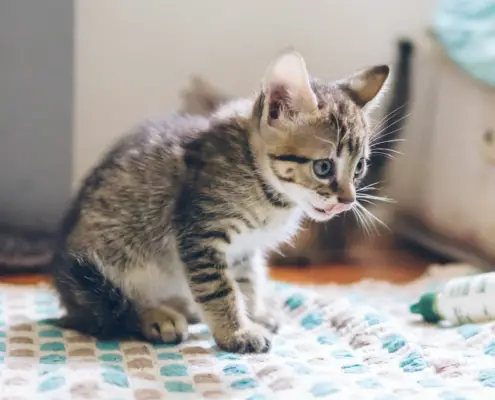
Cats are often known for their independent and aloof nature, but many cat owners have experienced moments of comfort and support from their feline companions. This raises the question: do cats have sympathy? While cats may not display sympathy in the same way humans do, there is evidence to suggest that they possess an empathetic side.
Cats are highly perceptive animals, with a keen ability to sense and respond to the emotions of those around them. They can pick up on subtle cues such as body language, tone of voice, and facial expressions. This heightened sensitivity allows them to understand when their human companions are feeling sad, anxious, or upset. In response, cats may offer comfort by curling up next to their owners, purring softly, or gently rubbing against them. These actions demonstrate a level of empathy and a desire to provide support.
Understanding sympathy in animals
Sympathy is the ability to understand and share the feelings of another being. While it is commonly associated with humans, research has shown that some animals also possess empathetic abilities. Animals such as dogs, elephants, and dolphins have been observed showing sympathy towards members of their own species as well as humans. This raises the question of whether cats, with their unique and often enigmatic personalities, are also capable of feeling sympathy.
Do cats exhibit sympathetic behaviors?
Cats may not exhibit sympathy in the same overt ways as other animals, but there are several behaviors that suggest they do possess a certain degree of empathy. For example, cats have been known to offer comfort to their owners during times of distress. They may sit close by, purr, or gently touch their owners with their paws. These actions can be soothing and provide a sense of emotional support.
In addition, cats often show concern when their owners are unwell. They may stay close by and monitor their owner’s condition, offering a calming presence. Some cats have even been known to nudge their owners gently when they are feeling down or experiencing physical pain. These behaviors indicate a level of emotional connection and an understanding of their owner’s well-being.
Signs that cats may feel sympathy
While cats may not express sympathy in the same way humans do, there are several signs that indicate they may feel empathy towards their owners. One of the most obvious signs is when a cat seeks physical contact with their owner during times of distress. This can include rubbing against their legs, sitting on their lap, or curling up next to them.
Another sign is when a cat alters their behavior to comfort their owner. For example, a normally independent cat may become more affectionate and seek out their owner’s company when they are feeling down. Additionally, cats may use vocalizations such as purring or meowing in a softer tone to provide comfort and reassurance.
Factors that influence a cat’s ability to feel sympathy
While many cats may exhibit empathetic behaviors, it is important to note that not all cats are the same. Just like humans, cats have unique personalities and temperaments that can influence their ability to feel sympathy. Factors such as genetics, early life experiences, and socialization can play a role in how empathetic a cat is.
Genetics may play a role in a cat’s ability to feel sympathy, as certain breeds are known for being more affectionate and attuned to their owners’ emotions. Early life experiences, such as positive interactions with humans during the critical socialization period, can also shape a cat’s empathetic tendencies. Cats that have had positive experiences with humans are more likely to develop strong bonds and exhibit empathetic behaviors.
The role of socialization in a cat’s empathy
Socialization plays a crucial role in shaping a cat’s ability to feel sympathy. During the first few weeks of life, kittens learn important social skills from their mother and littermates. This includes understanding and responding to the emotions of others. Kittens that receive proper socialization are more likely to develop strong empathetic abilities.
Additionally, ongoing socialization with humans and exposure to various environments can further enhance a cat’s empathy. Regular interactions with different people and animals can help cats develop a broader understanding of emotions and improve their ability to respond empathetically.
Research and studies on feline empathy
While research on feline empathy is still relatively limited, there have been some interesting studies conducted on this topic. One study published in the journal Animal Cognition found that cats were more likely to approach and interact with their owners when the owners were displaying signs of distress compared to when the owners were neutral. This suggests that cats may be able to recognize and respond to their owner’s emotions.
Another study published in the journal Behavioural Processes found that cats were more likely to solicit attention from their owners when the owners were ignoring them. This suggests that cats may have a basic understanding of their owner’s emotional state and use various behaviors to elicit a response.
While these studies provide some insight into feline empathy, more research is needed to fully understand the extent of cats’ empathetic abilities and how they compare to other animals.
How to foster empathy in cats
If you want to foster empathy in your cat, there are several things you can do. First and foremost, provide your cat with a loving and nurturing environment. Spend quality time with your cat, engage in interactive play, and provide plenty of positive reinforcement. This will help strengthen the bond between you and your cat, making them more likely to exhibit empathy towards you.
Additionally, expose your cat to a variety of experiences and socialization opportunities. This can include introducing them to new people, animals, and environments. The more diverse their experiences, the better they will be able to understand and respond to different emotions.
The benefits of having an empathetic cat
Having an empathetic cat can provide numerous benefits for both your mental and physical well-being. Cats that show empathy can offer comfort during times of stress, help alleviate feelings of loneliness, and provide a sense of emotional support. They can also help reduce anxiety and promote relaxation through their calming presence.
Furthermore, the bond that develops between an empathetic cat and their owner can be incredibly rewarding. Knowing that your cat understands and responds to your emotions can create a deep sense of connection and companionship.
Conclusion
While cats may not exhibit sympathy in the same overt ways as humans, there is evidence to suggest that they possess an empathetic side. Cats are highly perceptive animals that can sense and respond to the emotions of those around them. They may offer comfort and support in subtle ways, such as purring, rubbing against their owners, or staying close during times of distress. Factors such as genetics, early life experiences, and socialization can influence a cat’s ability to feel sympathy. By providing a loving and nurturing environment and exposing them to various experiences, you can foster empathy in your cat. The benefits of having an empathetic cat include emotional support, stress reduction, and a deep sense of companionship. So the next time your cat shows a glimmer of empathy, remember that they may just understand and care for you more than you realize.
If you enjoyed my article, I would appreciate you sharing it with your network.

Sima Ndlebe
Sima writes for CatBuzz. He is interested in Cats, Health and Fitness, and Entrepreneurship.
Published: 16 November 2023



